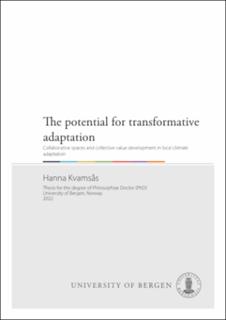The potential for transformative adaptation : Collaborative spaces and collective value development in local climate adaptation
Doctoral thesis

Åpne
Permanent lenke
https://hdl.handle.net/11250/3025315Utgivelsesdato
2022-10-20Metadata
Vis full innførselSamlinger
- Department of Geography [627]
Sammendrag
Behovet for klimaomstilling, -tilpassing og -handling for å kunne handtere konsekvensane av menneskeskapte klimaendringar og tap av biologisk mangfald har aldri vore større. Dette prosjektet utforskar korleis heilskaplege klimatilpassingstiltak og løysingar kan påverke klimaomstilling og samfunnsendring, samt handtere klimasårbarheit på lang sikt. I dag dreier klimatilpassing seg ofte om å finne tekniske og konkrete løysingar på kriser og risiko. Nokre løysingar vil krevje større endringar knytt til indre menneskelege dimensjonar som tankesett, tru, verdiar, normer, og verdssyn. Å ta omsyn til slike indre dimensjonar kan påverke endringsprosessar sterkt og er difor ein viktig del av klimaomstillings- og tilpassingsstrategiar. Med mål om å forstå potensialet for å fremje tilpassingsstrategiar som kan skape klimaomstilling og samfunnsendring, studerer eg samspel og samarbeid mellom aktørar på to klimatilpassingsarenaer, (1) samproduksjonsprosessar for klimakunnskap og (2) planleggingsprosessar for blå-grøn infrastruktur. Avhandlinga diskuterer korleis ein kan handtere interesser og verdiar, rolla til kollektive verdiar, samt potensialet heilskaplege klimatilpassingstilnærmingar kan skape. Eg analyserer både samproduksjonsmetodar i eit workshop-format og samhandling mellom aktørar i faktiske planleggingskontekstar. Dei to perspektiva viser kor viktig det er å skape både konkrete og mentale rom for samarbeid og forhandling mellom aktørar med ulike verdiar og interesser. Avhandlinga føreslår konkrete metodar for å skape slike rom, og legg vekt på kor viktig det er å beskrive indre dimensjonar på måtar som gir mening for menneska som arbeider i tekniske tilpassingskontekstar. Aktørane innan klimatilpassing i arealplanlegging representerer ofte verdiar knytt til yrkesfaglege ansvar, mandat og mål. Samtidig kan dei og utvikle kollektive verdisett på tvers av sektorinteresser. Denne avhandlinga sitt hovudbidrag til klimaomstilling- og klimatilpassingslitteraturen er korleis den empirisk viser potensialet for kollektiv verdiutvikling, samt mogelegheitene i fysisk urban infrastruktur som kan gi rom for å implementere nye måtar å tenke og arbeide med lokal tilpassing på. The need for climate action, adaptation and transformation in order to address the consequences and vulnerabilities of human-induced climate change and biodiversity loss has never been more critical. Current approaches to adaptation often revolve around technical responses to changing climate parameters. These approaches are vital, but climate adaptation also requires holistic and integral approaches to adaptation that require changes in the mindset, beliefs, values, norms and practices of people and organisations. Addressing these internal dimensions could provide deep leverage points for change and are a crucial part of transformative adaptation strategies. Aiming to understand the potential for advancing transformative adaptation strategies, I study the interaction and collaboration between relevant adaptation actors in two arenas: (1) climate service co-production processes and (2) blue-green infrastructure (BGI) planning processes. This thesis discusses how to address interests and values in adaptation, the role of collective values in adaptation, and the potential of holistic approaches to adaptation. It has combined co-production workshop methods with analysing collaborative adaptation efforts in actual planning contexts. The two perspectives highlight the importance of providing physical and collaborative spaces for negotiations between actors’ values and interests and have proposed concrete ways of doing so. These spaces are particularly vital in actual planning processes. I have also emphasised the importance of conceptualising the internal dimensions of transformation in ways that resonate with people working in technical adaptation contexts. The actors in BGI development processes generally represent values associated with their professional mandates, responsibilities and objectives in local adaptation work. However, they can also develop collective value sets across sector interests. The main contribution of this thesis to the transformative adaptation literature is how it empirically shows the potential for collective value development and the opportunities in material urban infrastructures to implement new ways of thinking and working on local adaptation.
Består av
Paper I: Kvamsås, H., Neby, S., Haarstad, H., Stiller-Reeve, M., & Schrage, J. (2021). Using collaborative hackathons to co-produce knowledge on local climate adaptation governance. Current Research in Environmental Sustainability, 3, 100023. The article is available at: https://hdl.handle.net/11250/3025644Paper II: Kvamsås, H. (2021). Addressing the adaptive challenges of alternative stormwater planning. Journal of Environmental Policy & Planning, 23(6), 809-821. The article is available at: https://hdl.handle.net/11250/2986582
Paper III: Kvamsås, H. (2022). Co-benefits and conflicts in alternative stormwater planning: Blue versus green infrastructure? Environmental Policy and Governance, in press. The article is available at: https://hdl.handle.net/11250/3025640
Paper IV: Kvamsås, H. Understanding holistic blue-green infrastructure implementation and mainstreaming. The article is not available in BORA.
